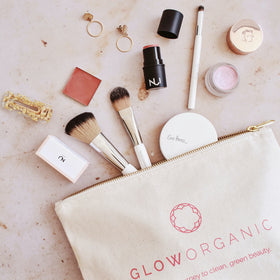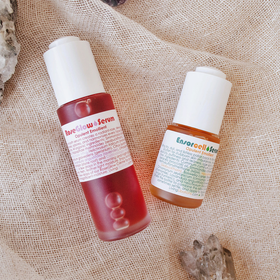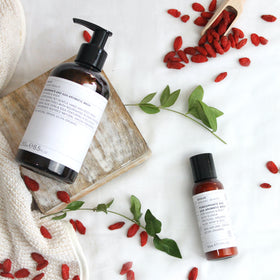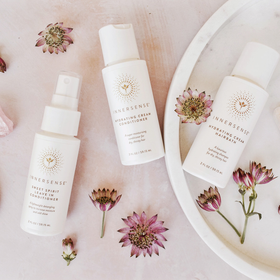
What Does 'Organic' Mean?

After seemingly appearing out of nowhere about a decade ago, the term “organic” is now ubiquitous. From fruit and veg to clothes, sanitary products, skincare and makeup, “organic” has now become a trend, and most brands want to brag about their organic credentials.
But what’s really behind this term? What are organic cosmetics and what are the advantages of using them compared to conventional, non-organic products? Find out more about the benefits of organic cosmetics, and learn how to make sense of the different certifications in this article.
What are Organic Cosmetics?
First, let’s focus on what the term “organic” actually covers. Organic cosmetics are made using ingredients derived from organically-farmed products, meaning that they haven’t been sprayed with herbicides, insecticides or chemical fertilizers and do not contain genetically modified organisms (GMOs).
What are the Benefits of Organic Cosmetics?
So what does that mean for you? First, it means that these nasty chemicals won’t make their way into your body through your skin’s cutaneous barrier. And that’s good news, since our overexposure to “everyday chemicals” has been linked to higher risks of developing cancer.
Secondly, natural, organic ingredients are a better solution to your skin problems. Most conventional beauty brands use synthetic ingredients to make their products smell and feel great on your skin, without much consideration for the long-term effect that these harsh chemicals can have. On the other hand, the ingredients traditionally used in organic cosmetics, such as cocoa butter, aloe vera or jojoba oil actually benefit your skin without irritating it. Just like nature intended! And organic farming allows for better preservation of those ingredients’ natural properties, making them more effective.
But that’s not all. Organically-farmed products also help protect the environment by encouraging healthier soil and protecting water streams from being polluted by chemicals. By its very nature, organic farming also protects wildlife and biodiversity, and could even help tackle climate change. According to the FAO, the Food and Agriculture Organisation of the United Nations, “lower greenhouse gas emissions for crop production and enhanced carbon sequestration, coupled with additional benefits of biodiversity and other environmental services, makes organic agriculture a farming method with many advantages and considerable potential for mitigating and adapting to climate change.” Finally, organic farming is also healthier for local people and farm workers.
Why Don’t “Organic” Products Contain 100% Organic Ingredients?
Despite their best intentions, brands can’t always be 100% organic. Organic ingredients are the product of organic farming, which means that ingredients that are not farmed and don’t grow out of the earth, such as water, salt or other minerals, are not technically “organic”. Water-based products, like Hynt Beauty’s Skin Prep Serum, which main ingredient is seawater, can therefore never be 100% organic.
Why are Some Brands Certified While Others Aren’t?
Simply put, certifications can be very costly. On top of the application fee (£699 + VAT for a Soil Association certification, as an example), brands also need to pay a yearly fee based on their sales figure. Small natural beauty brands can’t always afford that, and they don’t want to have to pass on this cost to their customers.
Besides, some brands work with small producers who themselves cannot afford the certification, even though they meet or exceed the standards. Some others might not qualify if their products mostly contain ingredients that aren’t farmed, like salt scrubs or water-based cosmetics.
What do the Different Organic Certifications Mean?
With many different certifications out there, it can be difficult for even the savviest consumers to know what’s behind the label. Here’s how to make sense of the most common organic certifications:
Soil Association and COSMOS
 The Soil Association is the UK's leading food and farming charity and organic certification body. They have their own certification, and have also worked with 4 other European organisations to create the COSMOS label. The goal is to harmonise worldwide organic beauty standards to help customers making more informed choices. The COSMOS label now always appear under the Soil Association Certification, though certain brands are still in the process of switching to the new COSMOS certification.
The Soil Association is the UK's leading food and farming charity and organic certification body. They have their own certification, and have also worked with 4 other European organisations to create the COSMOS label. The goal is to harmonise worldwide organic beauty standards to help customers making more informed choices. The COSMOS label now always appear under the Soil Association Certification, though certain brands are still in the process of switching to the new COSMOS certification.
The COSMOS logo guarantees that 95% of all the ingredients in a product are organic, and that it hasn’t been tested on animals.
All ECOCARE™ products are Certified Organic by the Soil Association, as well as being cruelty-free and made in Britain.
Ecocert
 Ecocert is a French label approved by the country’s Ministry of Agriculture. Like the COSMOS label, which Ecocert helped create alongside the Soil Association, the Ecocert label guarantees that 95% of all the ingredients are of natural origin. Products boasting the label, like Couleur Caramel’s range must not be tested on animals and be free of synthetic fragrances and dyes.
Ecocert is a French label approved by the country’s Ministry of Agriculture. Like the COSMOS label, which Ecocert helped create alongside the Soil Association, the Ecocert label guarantees that 95% of all the ingredients are of natural origin. Products boasting the label, like Couleur Caramel’s range must not be tested on animals and be free of synthetic fragrances and dyes.
Organic Food Chain Certified Organic Australia
 The Organic Food Chain (OFC) is an organic certifying organisation recognised by the Australian Department of Agriculture and Water Resources. Products certified by the OFC in Australia, like Eco by Sonya’s range, don’t contain GMOs or synthetic additives, don’t use chemical insecticides, herbicides or fungicides, do not interfere with the natural metabolism of livestock and plants and are not manufactured or produced using nanotechnology.
The Organic Food Chain (OFC) is an organic certifying organisation recognised by the Australian Department of Agriculture and Water Resources. Products certified by the OFC in Australia, like Eco by Sonya’s range, don’t contain GMOs or synthetic additives, don’t use chemical insecticides, herbicides or fungicides, do not interfere with the natural metabolism of livestock and plants and are not manufactured or produced using nanotechnology.







Leave a comment